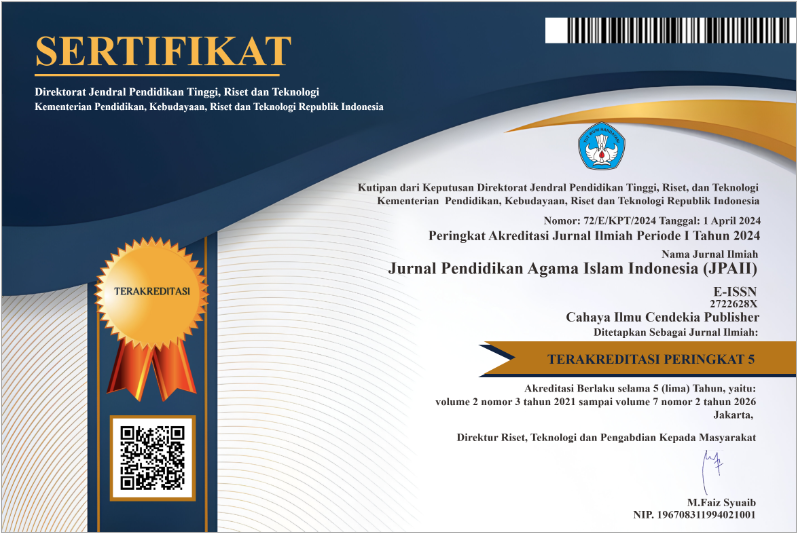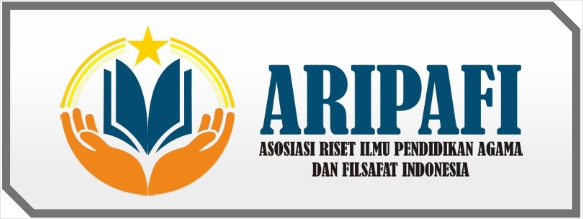Utilization of the Library as a Learning Resource for Students of the Department of Islamic Religious Education
Abstract
Purpose of the study: The library is one of the important learning resources for students who are pursuing higher education. Libraries offer access to various information and materials needed to enrich and complete the learning process. However, literature that focuses on the use of libraries among students majoring in Islamic religious education is still minimal. This qualitative descriptive research aims to find out how students majoring in Islamic religious education at the Muhammadiyah Sinai Islamic College use the library as a learning resource.
Methodology: This study uses qualitative research methods to collect data. The research sample consisted of librarians and students majoring in Islamic religious education at the Muhammaduyah Sinjai Islamic College. Interview instruments were used to collect data, and the data analysis technique used was Miles & Huberman, which involved an iterative process of coding and identifying themes.
Main Findings: The research findings reveal that students majoring in Islamic religious education utilize the library primarily to access religious texts and books, participate in group discussions, and study. This study also found that librarians facilitate students' access to information by offering reference and circulation services. In addition, this study notes that the library atmosphere provides students with a conducive environment for learning.
Novelty/Originality of this study: This research is a significant contribution to the body of knowledge in the field of Islamic religious education at the Muhammaduyah Sinjai Islamic College because it explores the use of library resources by students majoring in that field. This study provides insight into the unique challenges students face in accessing library resources and offers recommendations for enhancing their learning experience. This study is original in its approach and offers a new perspective on the use of the library as a learning resource for students of Islamic religious education at the Muhammaduyah Sinjai Islamic College..
Purpose of the study: The library is one of the important learning resources for students who are pursuing higher education. Libraries offer access to various information and materials needed to enrich and complete the learning process. However, literature that focuses on the use of libraries among students majoring in Islamic religious education is still minimal. This qualitative descriptive research aims to find out how students majoring in Islamic religious education at the Muhammadiyah Sinai Islamic College use the library as a learning resource.
Methodology: This study uses qualitative research methods to collect data. The research sample consisted of librarians and students majoring in Islamic religious education at the Muhammaduyah Sinjai Islamic College. Interview instruments were used to collect data, and the data analysis technique used was Miles & Huberman, which involved an iterative process of coding and identifying themes.
Main Findings: The research findings reveal that students majoring in Islamic religious education utilize the library primarily to access religious texts and books, participate in group discussions, and study. This study also found that librarians facilitate students' access to information by offering reference and circulation services. In addition, this study notes that the library atmosphere provides students with a conducive environment for learning.
Novelty/Originality of this study: This research is a significant contribution to the body of knowledge in the field of Islamic religious education at the Muhammaduyah Sinjai Islamic College because it explores the use of library resources by students majoring in that field. This study provides insight into the unique challenges students face in accessing library resources and offers recommendations for enhancing their learning experience. This study is original in its approach and offers a new perspective on the use of the library as a learning resource for students of Islamic religious education at the Muhammaduyah Sinjai Islamic College..
References
A. Amin, A. K. Batubara, A. Priatmana, S. P. Tanjung, and I. M. Nasution, “Strategi dan Manfaat Layanan Open Access Perpustakaan dalam Peningkatan Budaya Literasi,” ITQAN J. Ilmu-ilmu Kependidikan, vol. 13, no. 2, pp. 267–276, 2022.
T. Y. Cahyono, “Membuat dan Mengevaluasi Model Layanan Kolaboratif di Perpustakaan,” 2021.
A. Hamid, “Peranan Pendidikan Agama Islam Dalam Mengembangkan Fitrah Beragama,” Pendidik. Agama Islam, vol. 151–02, p. 41, 2018.
F. Lutfiyah and D. K. Wardani, “Relevansi Teori Multiple Intelligences Dengan Pendidikan Agama Islam Menurut Zakiah Daradjat di RA ‘Terpadu” Pojok Klitih Plandaan Jombang,” J. Educ. Manag. Stud., vol. 2, no. 6, 2019.
M. Munadi, F. Annur, and Y. Saputra, “Student Satisfaction in Online Learning of Islamic Higher Education in Indonesia during the Second Wave of COVID-19 Pandemic,” J. Educ. e-Learning Res., vol. 9, no. 2, pp. 87–94, 2022, doi: 10.20448/jeelr.v9i2.3952.
A. Asari, T. Kurniawan, S. Ansor, A. Bagus, and N. Rahma, “Kompetensi Literasi Digital Bagi Guru dan Pelajar,” BIBLIOTIKA J. Kaji. Perpust. dan Inf., vol. 3, no. 2, pp. 8–104, 2019.
R. E. Hamzah, “Penggunaan Media Sosial di Kampus Dalam Mendukung Pembelajaran Pendidikan,” WACANA J. Ilm. Ilmu Komun., vol. 14, no. 1, pp. 45–70, 2015.
K. Etikasari, “Misleading Konten Produk Kosmetik di Kalangan Mahasiswa Ilmu Perpustakaan UIN Sunan Kalijaga Yogyakarta,” 2022.
A. Asari et al., Manajemen perpustakaan. Get Press, 2022.
Copyright (c) 2023 Asriani Abbas

This work is licensed under a Creative Commons Attribution-NonCommercial 4.0 International License.
Authors who publish with this journal agree to the following terms:
- Authors retain copyright and acknowledge that the Jurnal Pendidikan Agama Islam Indonesia (JPAII) is the first publisher licensed under a Creative Commons Attribution 4.0 International License.
- Authors are able to enter into separate, additional contractual arrangements for the non-exclusive distribution of the journal's published version of the work (e.g., post it to an institutional repository or publish it in a book), with an acknowledgment of its initial publication in this journal.
- Authors are permitted and encouraged to post their work online (e.g., in institutional repositories or on their website) prior to and during the submission process, as it can lead to productive exchanges and earlier and greater citation of published work.






.png)
.png)





















